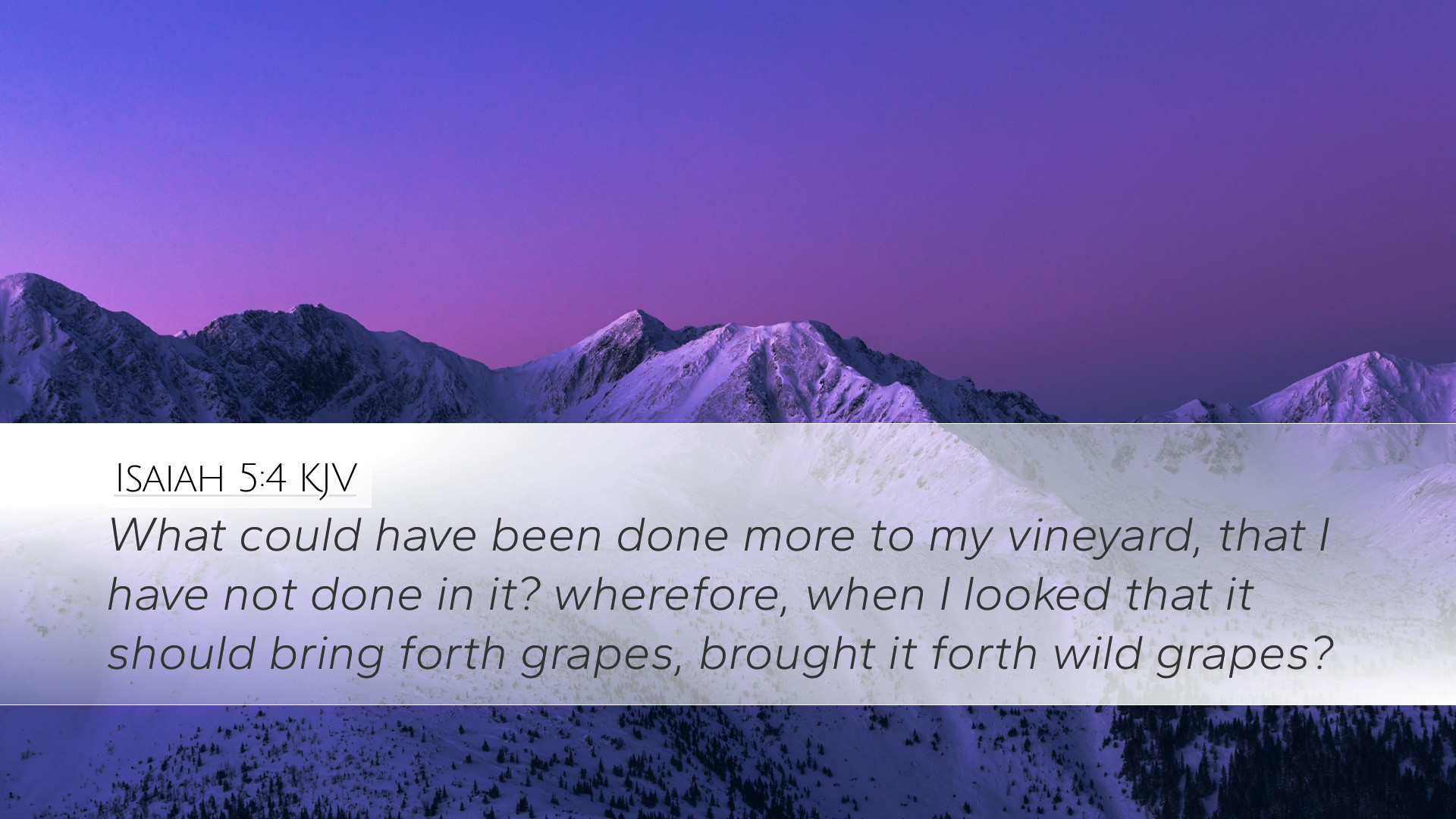Commentary on Isaiah 5:4
Isaiah 5:4 reads: "What could have been done more to my vineyard, that I have not done in it? Why, when I looked that it should bring forth grapes, brought it forth wild grapes?"
This verse is a poignant inquiry from God to His people, encapsulating the profound disappointment of the Divine Vineyard Keeper regarding the unfruitfulness of His vineyard—symbolizing Israel. This verse invites profound reflection on God's expectations and the resulting consequences of failing to meet them. The comprehensive insights from esteemed public domain commentaries offer a deeper understanding of the implications behind this rhetorical question.
Contextual Background
The preceding verses in Isaiah chapter 5 present a parable regarding the people of Israel, likening them to a vineyard planted on a fertile hill, tended meticulously by God. The imagery of the vineyard is a recurring motif in Scripture, serving as a metaphor for God's chosen people, their covenant relationship, and the resultant responsibilities.
Matthew Henry’s Commentary Insights
Matthew Henry, in his commentary, emphasizes the symbolic representation of the vineyard. He notes that God's question reveals His frustration and raises the issue of divine expectation versus human failure. He notes:
- Divine Investment: Henry underlines the lavish care and investment God made in Israel, which included giving them His Law, sending prophets, and providing a land flowing with milk and honey.
- Expectations for Righteousness: The expectation was for justice and righteousness, but instead, they produced 'wild grapes'—a metaphor for corruption, injustice, and sin.
- God’s Grieving Heart: The question reflects God's sorrow. He desires fruitfulness from His people, indicating an relational aspect of God that includes disappointment and emotional investment.
Albert Barnes’ Commentary Insights
Albert Barnes offers a complementary perspective, focusing on the rhetorical nature of the question posed by God. He elaborates by stating:
- God’s Faithfulness: Barnes highlights that God has done everything possible for His vineyard, leaving no stone unturned. This serves as a reminder of God's unyielding commitment to His people.
- Judgment and Accountability: He identifies the wild grapes as emblematic of the idolatry and moral decay prevalent among the Israelites, leading to divine judgment. The verse serves as both a lament and a warning about spiritual declension.
- Call for Self-Examination: Barnes suggests that this question necessitates self-reflection among believers about their own fruitfulness and faithfulness towards God’s gifts and calling.
Adam Clarke’s Commentary Insights
In his in-depth analysis, Adam Clarke provides additional layers of understanding, particularly the implications of the wild grapes:
- Symbolic Nature of Grapes: Clarke notes that grapes in Scripture often symbolize the results of moral and spiritual character, where good fruits signify righteousness and good works.
- Wild Grapes as Fruitlessness: He emphasizes that 'wild grapes' illustrate the wretched fruits of sin, implying a failure to adhere to the covenant with God and serve the intended purpose for which they were created.
- Theological Implication: Clarke indicates that the verse challenges readers to discern what it means to bear good fruit in alignment with God’s will and the broader implications for personal and communal spirituality.
Theological Reflections
Theological reflections derived from Isaiah 5:4 lead to several critical insights for pastors, theologians, and students:
- God's Sovereignty and Human Responsibility: The verse engages with the tension between divine sovereignty and human accountability, inviting an exploration of how God's grace invites responsibility.
- A Call to Cultivation: Just as the vineyard requires cultivation, so does the spiritual life of individuals and communities. This calls for intentional effort in nurturing faith, practice, and obedience to God.
- Examination of Fruitfulness: The examination of one's life in light of God's question lays the foundation for repentance and renewal. Believers are urged to assess whether the fruits of their life are consistent with God's expectations.
Application for Today
In contemporary application, Isaiah 5:4 resonates with the Church and individual believers:
- Reflecting on God’s Blessings: The Church is called to reflect on the many blessings God has provided—grace, scripture, community—and assess whether they are yielding the intended fruits of faith and good works.
- Corporate Responsibility: Just as Israel was a collective entity, congregations today must reflect on their collective witness and moral integrity in society.
- Embracing Accountability: This verse serves as a reminder to embrace accountability within the body of Christ. Disciplines of mutual encouragement and correction can lead to restorative outcomes.
Conclusion
Isaiah 5:4 serves as a profound reminder of God's expectations and the sobering reality of human disobedience. The insights gained from public domain commentaries enhance our understanding of this complex verse, urging a commitment to bear good fruit reflective of a transformational relationship with God. For pastors, students, theologians, and scholars, the message of accountability, divine care, and the call to fruitful living remains a perennial truth that challenges and encourages.


